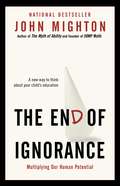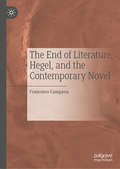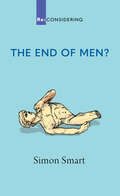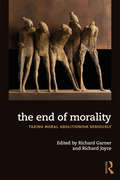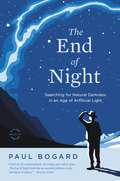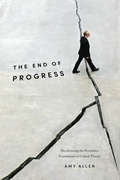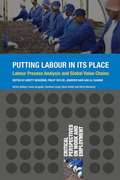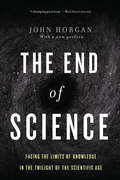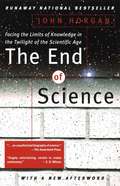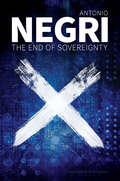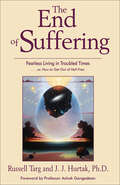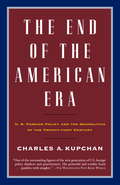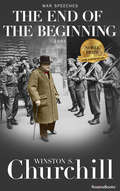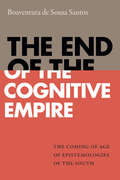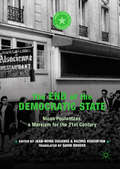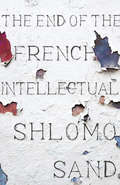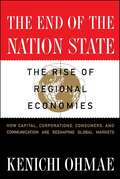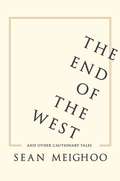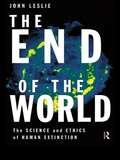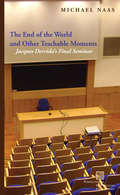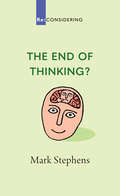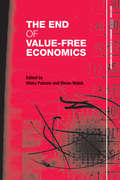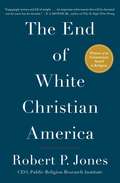- Table View
- List View
The End of Ignorance: Multiplying Our Human Potential
by John MightonA revolutionary call for a new understanding of how people learn. The End of Ignorance conceives of a world in which no child is left behind -- a world based on the assumption that each child has the potential to be successful in every subject. John Mighton argues that by recognizing the barriers that we have experienced in our own educational development, by identifying the moment that we became disenchanted with a certain subject and forever closed ourselves off to it, we will be able to eliminate these same barriers from standing in the way of our children. A passionate examination of our present education system, The End of Ignorance shows how we all can work together to reinvent the way that we are taught.John Mighton, the author of The Myth of Ability, is the founder of JUMP Math, a system of learning based on the fostering of emergent intelligence. The program has proved so successful an entire class of Grade 3 students, including so-called slow learners, scored over 90% on a Grade 6 math test. A group of British children who had effectively been written off as too unruly responded so enthusiastically and had such impressive results using the JUMP method that the school board has adopted the program. Inspired by the work he has done with thousands of students, Mighton shows us why we must not underestimate how much ground can be covered one small step at a time, and challenges us to re-examine the assumptions underlying current educational theory. He pays attention to how kids pay attention, chronicles what captures their imaginations, and explains why their sense of self-confidence and ability to focus are as important to their academic success at school as the content of their lessons.
The End of Literature, Hegel, and the Contemporary Novel
by Francesco CampanaThis book explores the concept of the end of literature through the lens of Hegel's philosophy of art. In his version of Hegel's 'end of art' thesis, Arthur Danto claimed that contemporary art has abandoned its distinctive sensitive and emotive features to become increasingly reflective. Contemporary art has become a question of philosophical reflection on itself and on the world, thus producing an epochal change in art history. The core idea of this book is that this thesis applies quite well to all forms of art except one, namely literature: literature resists its 'end'.Unlike other arts, which have experienced significant fractures in the contemporary world, Campana proposes that literature has always known how to renew itself in order to retain its distinguishing features, so much so that in a way it has always come to terms with its own end. Analysing the distinct character of literature, this book proposes a new and original interpretation of the 'end of art' thesis, showing how it can be used as a key conceptual framework to understand the contemporary novel.
The End of Men? (Re: CONSIDERING)
by Simon SmartRe:CONSIDERING invites you to look at what’s familiar from an unfamiliar angle. To consider how we consider things – and how to do it better.What makes a good man?In this grounded, forthright and hopeful book, Simon Smart reconsiders the modern male dilemma.Models of masculinity may be less constricting than they used to be – but boys and men are confused about what’s expected of them, and it shows. In education, in mental health, in relationships, they’re struggling. And we’re all struggling to have a constructive conversation about the challenges they face.Drawing on his own experiences of schooling and fatherhood, the best contemporary research, interviews with those on the front lines of a growing crisis, as well as ancient wisdom, Simon Smart asks the question: how can we help boys become their best selves, and a gift to those around them?
The End of Morality: Taking Moral Abolitionism Seriously
by Richard Joyce Richard GarnerAccording to the moral error theorist, all moral judgments are mistaken. The world just doesn’t contain the properties and relations necessary for these judgments to be true. But what should we actually do if we decided that we are in this radical and unsettling predicament—that morality is just a widespread and heartfelt illusion? One suggestion is to eliminate all talk and thought of morality (abolitionism). Another is to carry on believing it anyway (conservationism). And yet another is to treat morality as a kind of convenient fiction (fictionalism). We tend to think of moral thinking as valuable and useful (e.g., for motivating cooperative behavior), but we can also recognize that it can be harmful (e.g., hindering compromise) and even disastrous (e.g., inspiring support for militaristic propaganda). Would we be better off or worse off if we stopped basing decisions on moral considerations?This is a collection of twelve brand new chapters focused on a critical examination of the options available to the moral error theorist. After a general introduction outlining the topic, explaining key terminology, and offering suggestions for further reading, the chapters address questions like:• Is it true that the more that people are motivated by moral concerns, the more likely it is that society will be elitist, authoritarian, and dishonest?• Is an appeal to moral values a useful tool for helping resolve conflicts, or does it actually exacerbate conflicts?• Would it even be possible to abolish morality from our thinking? • If we were to accept a moral error theory, would it be feasible to carry on believing in morality in everyday contexts?• Might moral discourse be usefully modeled on familiar metaphorical language, where we can convey useful and important truths by uttering falsehoods?• Does moral thinking support or undermine a commitment to feminist goals?• What role do moral judgments play in addressing important decisions affecting climate change?The End of Morality: Taking Moral Abolitionism Seriously is the first book to thoroughly address these and other questions, systematically investigating the harms and benefits of moral thought, and considering what the world might be like without morality.
The End of Night: Searching for Natural Darkness in an Age of Artificial Light
by Paul BogardA deeply panoramic tour of the night, from its brightest spots to the darkest skies we have left. A starry night is one of nature's most magical wonders. Yet in our artificially lit world, three-quarters of Americans' eyes never switch to night vision and most of us no longer experience true darkness. In THE END OF NIGHT, Paul Bogard restores our awareness of the spectacularly primal, wildly dark night sky and how it has influenced the human experience across everything from science to art. From Las Vegas' Luxor Beam--the brightest single spot on this planet--to nights so starlit the sky looks like snow, Bogard blends personal narrative, natural history, science, and history to shed light on the importance of darkness--what we've lost, what we still have, and what we might regain--and the simple ways we can reduce the brightness of our nights tonight.
The End of Progress: Decolonizing the Normative Foundations of Critical Theory
by Amy AllenRethinking the future of critical theory in the wake of postcolonial critique.
The End of Progress: Decolonizing the Normative Foundations of Critical Theory (New Directions in Critical Theory #36)
by Amy AllenWhile post- and decolonial theorists have thoroughly debunked the idea of historical progress as a Eurocentric, imperialist, and neocolonialist fallacy, many of the most prominent contemporary thinkers associated with the Frankfurt School—Jürgen Habermas, Axel Honneth, and Rainer Forst—have defended ideas of progress, development, and modernity and have even made such ideas central to their normative claims. Can the Frankfurt School's goal of radical social change survive this critique? And what would a decolonized critical theory look like?Amy Allen fractures critical theory from within by dispensing with its progressive reading of history while retaining its notion of progress as a political imperative, so eloquently defended by Adorno. Critical theory, according to Allen, is the best resource we have for achieving emancipatory social goals. In reimagining a decolonized critical theory after the end of progress, she rescues it from oblivion and gives it a future.
The End Of Russian Philosophy
by Alyssa DeblasioThe End of Russian Philosophy describes and evaluates the troubled state of Russian philosophical thought in the post-Soviet decades. The book suggests that in order to revive philosophy as a universal, professional discipline in Russia, it may be necessary for Russian philosophy to first do away with the messianic traditions of the 19th century.
The End of Science: Facing The Limits Of Knowledge In The Twilight Of The Scientific Age
by John HorganIn The End of Science, John Horgan makes the case that the era of truly profound scientific revelations about the universe and our place in it is over. Interviewing scientific luminaries such as Stephen Hawking, Francis Crick, and Richard Dawkins, he demonstrates that all the big questions that can be answered have been answered, as science bumps up against fundamental limits. The world cannot give us a "theory of everything,” and modern endeavors such as string theory are "ironic” and "theological” in nature, not scientific, because they are impossible to confirm. Horgan’s argument was controversial in 1996, and it remains so today, still firing up debates in labs and on the internet, not least because--as Horgan details in a lengthy new introduction--ironic science is more prevalent than ever. Still, while Horgan offers his critique, grounded in the thinking of the world’s leading researchers, he offers homage, too. If science is ending, he maintains, it is only because it has done its work so well.
The End Of Science
by John HorganThis provocative bestseller explores the entire scientific landscape through the eyes of the world's leading scholars and sheds light on what the future of science is and what science holds for the future as a civilization. Noam Chomsky, Stephen Hawking, Karl Popper and others give their candid reflections on everything from the implications of chaos theory to the existence of God, challenging some of the most basic assumptions about the world.
The End of Sovereignty
by Antonio NegriThis book brings together Antonio Negri&’s critical writings on the nature and form of the modern state. The central theme that runs through these writings is our need to be done with the sovereign state – that is, with the particular form of political power that the capitalist organization of bourgeois society has imposed upon us. Negri seeks to show how the sovereign bourgeois state built in the course of modernity has now become a weapon in the hands of a declining ruling class, a class sometimes exhausted in its institutional expressions and sometimes frenetic, zombie-like and parafascist. In arguing that the despotic power of the state should be abolished, Negri distances himself from some other left-wing thinkers who, erroneously in his view, have come to see the state as an unavoidable institution rather than as a place of power that, once conquered, should be transformed and ultimately dissolved, since it represents the central moment in the organization of force against living labour and free citizenship. In Negri&’s view, the call for the abolition of the state remains vital and active today, as a concrete utopia that is expressed in every thought and act of liberation. The articles brought together in this volume range from Negri&’s analysis of the first great transformation of the capitalist state in the twentieth century, a phenomenon precipitated by the triumph of Keynesianism, to his more recent work on how the form of sovereignty changed from being a figure of transcendent and local command to being a dispositif of immanent and global control. Like its companion volumes, this new collection of essays by Negri will be a valuable resource for anyone interested in radical politics and in the key social and political struggles of our time.
The End of Suffering: Fearless Living in Troubled Time . . . or, How to Get Out of Hell Free
by Russell Targ J. J. HurtakThis spiritual inquiry into the nature of truth draws on Buddhism and quantum physics to liberate us from limited understandings of ourselves and others.The hopeful teaching of this book is that while everybody suffers, most of this suffering is unnecessary—it can be overcome. The belief that things must be either true or untrue leads us to think in terms of polarities: good or evil, right or wrong. This friend-or-foe approach may seem to make life easier, but in The End of Suffering, Russell Targ and J. J. Hurtak assert that this worldview only increases our experience of suffering.In an effort to overcome the polarity of opposites and the accompanying suffering, Targ and Hurtak combine the wisdom of the East with the findings of quantum physics, uncovering a middle ground that shows opposing sides are really the same.Buddha taught us to live a helpful and compassionate life and to surrender our ego to the peace of spaciousness. The middle path of Buddhism also shows that things may be neither true nor not true, or both true and untrue. The End of Suffering puts the perceived opposites of Buddhism and physics together, showing step-by-step how we can learn to surrender the story of who we think we are and experience an end to our suffering.
The End of the American Era: U. S. Foreign Policy and the Geopolitics of the Twenty-first Century
by Charles KupchanRefuting the conventional wisdom that the end of the Cold War cleared the way for an era of peace and prosperity led solely by the United States, Charles A. Kupchan contends that the next challenge to America's might is fast emerging. It comes not from the Islamic world or an ascendant China, but from an integrating Europe that is rising as a counterweight to the United States. Decades of strategic partnership across the Atlantic are giving way to renewed geopolitical competition. The waning of U.S. primacy will be expedited by America's own ambivalence about remaining the globe's guardian and by the impact of the digital age on the country's politics and its role in the world. By deftly mining the lessons of history to cast light on the present and future, Kupchan explains how America and the world should prepare for the more complex, more unstable road ahead.From the Trade Paperback edition.
The End of the Beginning: 1943 (Winston S. Churchill War Speeches)
by Winston S. ChurchillThis collection of WWII speeches by the Nobel Prize-winning Prime Minister reflect his determination in the face of a fearsome enemy. 1942 was an important turning point in World War II. Britain and its allies had faced considerable challenges thus far. Beset by bombings and devastated by personal loss and the restrictions of war, the British public was losing patience with the war effort—and their prime minister. This collection of Winston Churchill&’s wartime speeches from 1942 provides an enlightening commentary on this volatile time in history from the point of view of one of its most prominent leaders. Churchill faced an uphill battle in his military efforts as well as in gathering political and public support for the struggle to come. But the tides had turned when the United States joined the war at the end of 1941. Churchill has been quoted as saying he felt certain of the Allied victory with the US on his side—and his speeches reflect this renewed sense of hope and conviction.
The End of the Cognitive Empire: The Coming of Age of Epistemologies of the South
by Boaventura De SantosIn The End of the Cognitive Empire Boaventura de Sousa Santos further develops his concept of the "epistemologies of the South," in which he outlines a theoretical, methodological, and pedagogical framework for challenging the dominance of Eurocentric thought. As a collection of knowledges born of and anchored in the experiences of marginalized peoples who actively resist capitalism, colonialism, and patriarchy, epistemologies of the South represent those forms of knowledge that are generally discredited, erased, and ignored by dominant cultures of the global North. Noting the declining efficacy of established social and political solutions to combat inequality and discrimination, Santos suggests that global justice can only come about through an epistemological shift that guarantees cognitive justice. Such a shift would create new, alternative strategies for political mobilization and activism and give oppressed social groups the means through which to represent the world as their own and in their own terms.
The End of the Democratic State: Nicos Poulantzas, a Marxism for the 21st Century (Marx, Engels, and Marxisms)
by Jean-Numa Ducange Razmig Keucheyan David BroderThis edited volume takes a close look at Nicos Poulantzas’s thought as a means of understanding the dynamics of the capitalist, neoliberal state in the 21st century. Nicos Poulantzas has left us with one of the most sophisticated theories of the state in the second half of the 20th century. Poulantzas’s influential theory draws inspiration from Marx, Lenin, Weber, and Foucault, among other thinkers, conceiving of the relationship between capitalism and the state as particularly original. This book aims to use Poulantzas’s theory of the capitalist state in order to understand important political and economic trends that have taken place since Poulantzas’s death in 1979. By entering into a dialogue with current Marxist and critical research in diverse fields such as political science, philosophy, sociology, history, and geography, this volume purports to evaluate the actuality of Poulantzas’s thought.
The End of the French Intellectual: From Zola to Houellebecq
by Shlomo SandCharting the decline of the French intellectual, from the Dreyfus Affair to IslamophobiaThe best-selling author of The Invention of the Jewish People, Shlomo Sand examines the troublesome figure of the French intellectual. Revered throughout the Francophile world, France’s tradition of public intellectual engagement stems from Voltaire and Zola and runs through Sartre and Foucault to the present day. The intellectual enjoys a status as the ethical lodestar of his nation’s life, but, as Sand shows, the recent history of these esteemed figures shows how often, and how profoundly, they have fallen short of the ideal. Sand examines Sartre and de Beauvoir’s unsettling accommodations during the Nazi occupation and then shows how Muslims have replaced Jews as the nation’s scapegoats for a new generation of public intellectuals, including Michel Houellebecq and Alain Finkielkraut. Possessing an intimate knowledge of the Parisian intellectual milieu, Sand laments the degradation of a literary elite, but questions the value of that class at the best of times. Drawing parallels between the Dreyfus Affair and Charlie Hebdo, while mixing reminiscence with analysis, Sand casts a characteristically candid and mordant gaze upon the intellectual scene of today.
The End of the Nation State: The Rise of Regional Economies
by Kenichi OhmaeArguing that nation states are forfeiting their role in the global economy, the author contends that other forces have usurped economic power--capital, corporations, customers, communications, and currencies--and that natural economic zones or region states are emerging.
The End of the West and Other Cautionary Tales
by Sean MeighooMost historical accounts take it for granted that the guiding principles of the Western tradition-reason, progress, and freedom-have been passed down directly from ancient Greece to modern Western society. Today, many commentators maintain that the Western tradition is fast approaching its end as it becomes more and more integrated with non-Western cultures. But what if we are witnessing something else entirely-not the end of the West but rather another historical mutation of the idea of the West?This groundbreaking critique shows that whether the West is hailed as the source of all historical progress or scorned as the root of all cultural imperialism, it remains a deeply problematic concept that is intrinsically connected to an ethnocentric view of the world. Reading the work of the continental philosophers Husserl, Heidegger, Levinas, and Derrida, as well as the postcolonial thinkers Said, Mohanty, Bhabha, and Trinh, Sean Meighoo strikes at the intellectual foundations of Western exceptionalism until its ideological supports show through. Deconstructing the concept of the West in his provocative interpretations of Martin Bernal's controversial work Black Athena and the Beatles' second film, Help!, Meighoo poses a formidable question to philosophers, writers, political scientists, and cultural critics alike: Can we mount an effective critique of Western ethnocentrism without reinforcing the idea of the West itself?
The End of the West and Other Cautionary Tales
by Sean MeighooMost historical accounts of "the West" take it for granted that the guiding principles of the Western tradition—reason, progress, and freedom—have been passed down directly from ancient Greece to modern Europe, evolving in isolation from all non-Western cultures. Today, many political analysts and cultural critics maintain that the Western tradition is fast approaching its end, for better or worse, as it becomes more and more integrated with non-Western cultures in an increasingly globalized world. But what if we are witnessing something else entirely—not the "end" of the West but rather another historical mutation of the idea of the West itself?This groundbreaking work shows that whether the West is hailed as the source of all historical progress or scorned as the root of all cultural imperialism, it remains a deeply problematic concept that is intrinsically connected to an ethnocentric view of the world. In a critical reading of the continental philosophers Husserl, Heidegger, Levinas, and Derrida as well as the postcolonial thinkers Said, Mohanty, Bhabha, and Trinh, Sean Meighoo strikes at the intellectual foundations of Western exceptionalism until its ideological supports show through. Deconstructing the concept of the West in his provocative interpretations of Martin Bernal's controversial publication Black Athena and the Beatles' second film Help!, Meighoo poses a formidable question to philosophers, writers, political analysts, and cultural critics alike: Can we mount an effective critique of Western ethnocentrism without reinforcing the very idea of the West?
The End of the World: The Science and Ethics of Human Extinction
by John LeslieAre we in imminent danger of extinction? Yes, we probably are, argues John Leslie in his chilling account of the dangers facing the human race as we approach the second millenium. The End of the World is a sobering assessment of the many disasters that scientists have predicted and speculated on as leading to apocalypse. In the first comprehensive survey, potential catastrophes - ranging from deadly diseases to high-energy physics experiments - are explored to help us understand the risks. One of the greatest threats facing humankind, however, is the insurmountable fact that we are a relatively young species, a risk which is at the heart of the 'Doomsday Argument'. This argument, if correct, makes the dangers we face more serious than we could have ever imagined. This more than anything makes the arrogance and ignorance of politicians, and indeed philosophers, so disturbing as they continue to ignore the manifest dangers facing future generations.
The End of the World and Other Teachable Moments: Jacques Derrida's Final Seminar (Perspectives in Continental Philosophy)
by Michael NaasThe End of the World and Other Teachable Moments follows the remarkable itinerary of Jacques Derrida’s final seminar, “The Beast and the Sovereign” (2001–3), as the explicit themes of the seminar—namely, sovereignty and the question of the animal—come to be supplemented and interrupted by questions of death, mourning, survival, the archive, and, especially, the end of the world.The book begins with Derrida’s analyses, in the first year of the seminar, of the question of the animal in the context of his other published works on the same subject. It then follows Derrida through the second year of the seminar, presented in Paris from December 2002 to March 2003, as a very different tone begins to make itself heard, one that wavers between melancholy and an extraordinary lucidity with regard to the end. Focusing the entire year on just two works, Daniel Defoe’s Robinson Crusoe and Martin Heidegger’s seminar of 1929–30, “The Fundamental Concepts of Metaphysics,” the seminar comes to be dominated by questions of the end of the world and of an originary violence that at once gives rise to and effaces all things.The End of the World and Other Teachable Moments follows Derrida as he responds from week to week to these emerging questions, as well as to important events unfolding around him, both world events—the aftermath of 9/11, the American invasion of Iraq—and more personal ones, from the death of Maurice Blanchot to intimations of his own death less than two years away. All this, the book concludes, makes this final seminar an absolutely unique work in Derrida’s corpus, one that both speaks of death as the end of the world and itself now testifies to that end—just one, though hardly the least, of its many teachable moments.
The End of Thinking? (Re: CONSIDERING)
by Mark StephensRe:CONSIDERING invites you to look at what’s familiar from an unfamiliar angle. To consider how we consider things – and how to do it better.What were you thinking?We all feel entitled to our opinion. Whether it be our take on politics, vaccines, parenting, or the value of religion, everybody wants to have their say – and everybody loves to be right.But do we know what it means to think well?Covering ‘idiot brain’, lobotomies, the difference between certainty and confidence, the nature of facts, and the virtue of intellectual hospitality, Mark Stephens invites you to consider not just what you think but how and why you think.Do we think only for ourselves, or also for the good of others?
The End of Value-Free Economics (Routledge Inem Advances In Economic Methodology Ser. #13)
by Hilary Putnam Vivian WalshThis book brings together key players in the current debate on positive and normative science and philosophy and value judgements in economics. Both editors have engaged in these debates throughout their careers from its early foundations; Putnam as a doctorial student of Hans Reichenbach at UCLA and Walsh a junior member of Lord Robbins’s department at the London School of Economics, both in the early 1950s. This book collects recent contributions from Martha Nussbaum, Amartya Sen and Partha Dasgupta, as well as a new chapter from the editors.
The End of White Christian America
by Robert P. Jones&“Quite possibly the most illuminating text for this election year&” (The New York Times Book Review). *Winner of the Grawemeyer Award in Religion* Robert P. Jones, CEO of the Public Religion Research Institute, spells out the profound political and cultural consequences of a new reality—that America is no longer a majority white Christian nation. For most of our nation’s history, White Christian America (WCA) set the tone for our national policy and shaped American ideals. But especially since the 1990s, WCA has steadily lost influence, following declines within both its mainline and evangelical branches. Today, America is no longer demographically or culturally a majority white, Christian nation. Drawing on more than four decades of polling data, The End of White Christian America explains and analyzes the waning vitality of WCA. Robert P. Jones argues that the visceral nature of today’s most heated issues—the vociferous arguments around same-sex marriage and religious and sexual liberty, the rise of the Tea Party following the election of our first black president, and stark disagreements between black and white Americans over the fairness of the criminal justice system—can only be understood against the backdrop of white Christians’ anxieties as America’s racial and religious topography shifts around them. Beyond 2016, the descendants of WCA will lack the political power they once had to set the terms of the nation’s debate over values and morals and to determine election outcomes. Looking ahead, Jones forecasts the ways that they might adjust to find their place in the new America—and the consequences for us all if they don’t. “Jones’s analysis is an insightful combination of history, sociology, religious studies, and political science….This book will be of interest to a wide range of readers across the political spectrum” (Library Journal).
